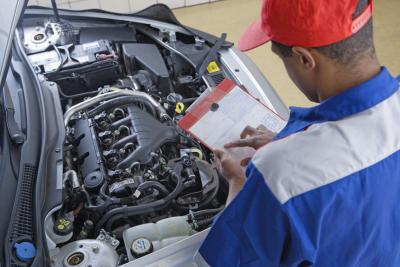
Performing preventive maintenance on your high-mileage car will extend the life of your vehicle, keep your car in a safe condition to drive, makes your car more dependable and less likely to break down and can give you a higher trade-in value on your car. Simple and cost effective maintenance saves you money on costly repairs.
Changing your oil every 3,000 miles is a good place to start. Quality oils and filters should be used. Engine oil lubricates and protects the moving parts of your engine, as well as ridding the engine of grime and crude buildup. Fresh oil will protect your engine from premature wear. High-mileage cars tend to burn oil faster, so always keep a check on your oil levels. Check other oils, such as automatic transmission fluid, power steering fluids and gear oils. These oils should be changed according to the manufacturer's specifications or as needed.
Coolant system should be flushed approximately every two years to prevent corrosion buildup. The thermostat and seal for the cooling system needs to be checked and replaced every few years to avoid failure. Regularly check your cooling system fan, water pump and hoses to assure they are in proper working order. The radiator should be checked for buildup on the inside and to ensure you have proper amounts of coolant at all times.
Brakes will need attention every few years. Maintain good brake pads, brake shoes and your clutch. Brake pads and shoes are designed to wear out over time and will need to be replaced. Brake fluid needs to be maintained and replaced once a year to avoid rust and sludge buildup.
Transmission fluid should be changed every 50,000 miles. Transmission fluid keeps your transmission lubricated. Check for leaks around the drain plug and never let your transmission fluid run low.
Tires need to be checked for correct air pressure. Keeping the correct amount of tire pressure will help extend the life of your tires. Tires will need to be replaced once the tread has worn. Tire rotation is important to help maintain your tires.
Your car battery should be inspected for corrosion and kept clean. Regularly check on your belts, spark plugs, distributor cap and rotor. Making sure they are all in good working order. Replacing worn-out parts will help maintain the life of your high-mileage car.
Preventive maintenance on your high-mileage car will help keep it on the road for many more miles. Following your manufacturer's recommended guidelines for maintenance and replacing worn-out parts as needed will keep your car running smoother.
Schedule regular tune-ups for your high-mileage car. Tune-ups will help increase your engine's life and can improve your gas mileage. Routine tune-ups for most vehicles are done every 30,000 miles. Consider having a major maintenance tune-up performed every 60,000 miles.